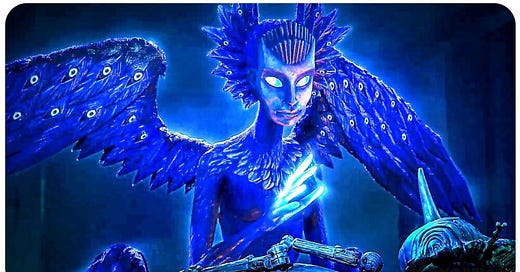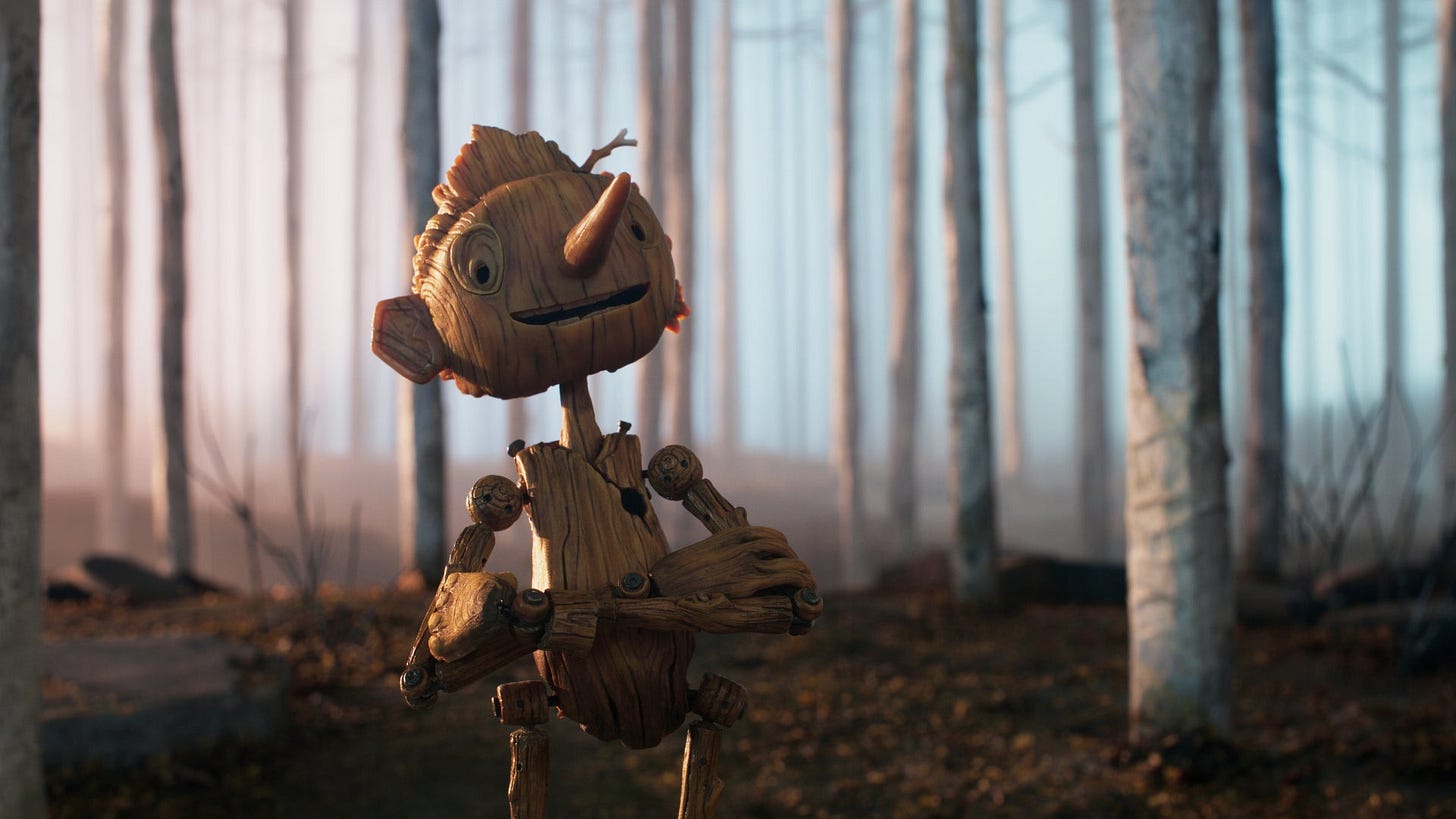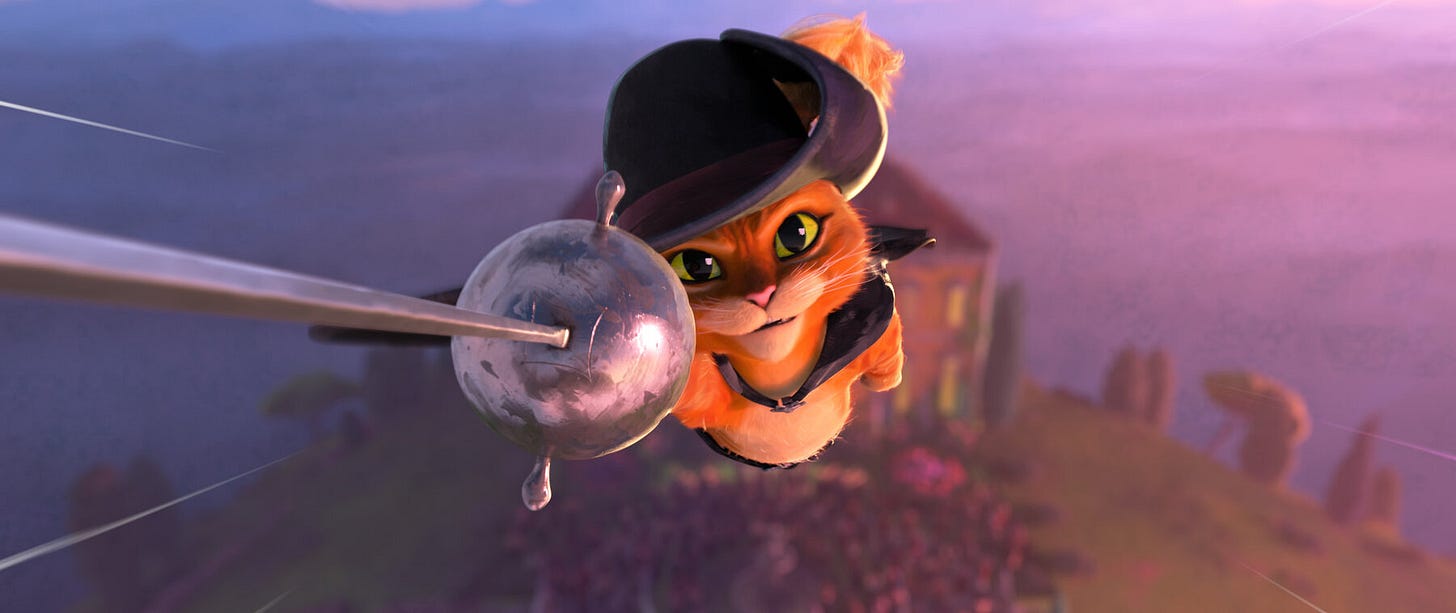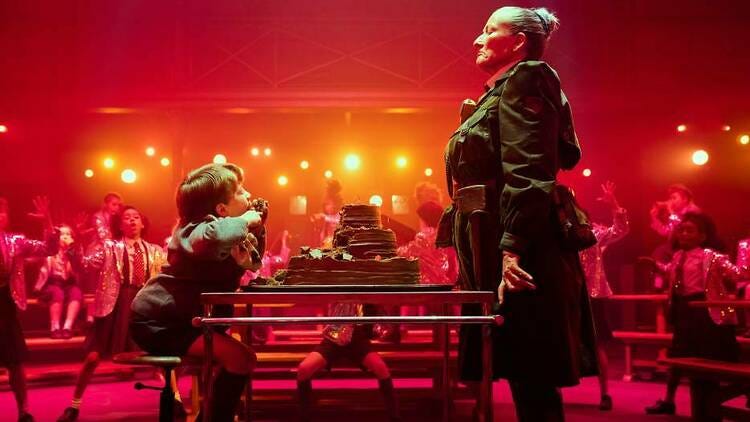Facing mortality (you know, for kids!)
Three (good) new kids’ movies aren’t afraid to get a bit dark
I hope you all had a restful holiday season, and that the early days of the new year are treating you well.
We had an enjoyable Christmas and I’m excited to be a week into 2023 with recharged batteries. Two weeks off work and school is a long time – when you’re home with two young kids, it’s a very long time, indeed. And while I’ve enjoyed the rest, I’ve also found myself itching to get back behind the keyboard. To me, that’s the sign of a good break: To rest enough that your brain is ready to be productive again.
Monday, I’ll be launched directly into the thick of it. Work starts back for me on Jan. 9, and I’ve already got a pretty hefty to-do list waiting. I’m also beginning a graduate certificate course, and the semester also begins on Monday. So, there’s a busy year coming – why not get to the movies first?
Perhaps unsurprisingly, I spent a good deal of time watching family movies over the break. That’s a go-to way to catch up on movies when you have young kids at home. And I was surprised to see that all three of the new kids’ releases we watched (we’re going to ignore Lyle, Lyle Crocodile, which I half-watched and is…fine) really impressed me.
But someone really needs to check on the creators of animated films; based on two recent releases in particular, they’re going through some things.
Grappling with death is, perhaps, not a surprise for a film coming from Guillermo del Toro. He’s long been obsessed with monsters, darkness, losses of innocence and the evil men do. And those hallmarks are all there in Guillermo del Toro’s Pinocchio, a retelling of the beloved story that feels just as ripped from the auteur’s mind as it does from Carlo Collodi’s story.
It’s no secret that I flat out hated Robert Zemeckis’ recent Disney adaptation of the story, and it’s perhaps no surprise to find that del Toro’s version (co-directed with Mark Gustafson) is miles better. Where the Disney+ monstrosity felt like a hacky, paint-by-numbers approach, del Toro’s is heartfelt and intimate, allowing the director to explore themes and interests that have long been a crucial part of his work, be that ferocious monsters, the effects of war on children, or the importance and beauty of accepting our own mortality. In fact, del Toro’s story takes some of the same liberties as Zemeckis’ – including making Geppetto (David Bradley) a brokenhearted man mourning the loss of a son – but they work here because they are crucial to the story’s deeper themes.
Set in Italy during World War II, this Pinocchio finds Geppetto a despondent wreck who creates his puppet-son out of drunken despair. While the story follows the expected beats – growing noses, abandoning school for stardom, sea monsters swallowing the characters whole – del Toro brings his own mixture of whimsy and darkness. There are floating eyeball spirits, multi-winged blue fairies voiced by Tilda Swinton, multiple deaths for Pinocchio and a camp designed to turn boys into cannon fodder for the Italian army. Also, Tom Kenny – the voice of Spongebob Squarepants – voices Mussolini. There’s also, of course, a talking cricket, voiced by Ewan MacGregor, which might be the one weak link. While I applaud that this take on the cricket (not named Jiminy) is a bit of a more selfish character who also has lessons to learn, the film too often saddles it with pratfalls and dialogue that feel just a tad too modern and out of place in this otherwise lush and thoughtful movie.
GDT’s Pinocchio is just as much a triumph for craftsmanship as Avatar: The Way of Water. The stop-motion animation is gorgeous, a beautifully realized world that feels pulled from a storybook. Pinocchio is a weird and unsettling creation, his limbs roughly hewn, nails sticking out of his back. I could spend hours staring at the grooves in Geppetto’s beard, and the world is just as tangible and brilliantly imagined as anything on Pandora. It might seem a bit on the nose that a famous story about a puppet is told via a form of puppetry, but it also ties into the film’s themes. Del Toro examines the way adults try to force people to behave certain ways – parents trying to raise obedient children, churches using fear to coerce behavior, armies grinding away personality to create weapons of war – and argues that, sometimes, a little curiosity and disobedience is a necessary, even liberating, thing.
It might be a bit much for young children expecting a fun story about telling the truth. Much of Pinocchio’s journey to realness involves an acceptance of the mortality that comes with it, and while the story has fun with the character’s multiple “deaths” (the afterlife here is one of the most inventive this side of Beetlejuice), it’s unafraid to venture into some bittersweet waters in its final passages. This is a movie with a lot on its mind – possibly too much for del Toro to wrap his arms fully around – and if the ideas go over younger viewers’ heads, I applaud him for not condescending. I venture this is one that will give some kids nightmares today, but they’re going to find it hard to shake for reasons they can’t explain – and, in time, they’ll grow into this gorgeous adaptation of an oft-told tale.
While musings on inevitable death might be expected from del Toro, I did not expect existential angst from the sixth film in the Shrek franchise. But here we are.
I took the kids to see Puss in Boots: The Last Wish mainly because it was a good way to get them out of my wife’s hair for the afternoon. It was crammed into an afternoon of running errands and, to be completely honest, I was content to sit there and just let my mind wander. We picked it because it was the only kids’ movie showing at our local AMC that afternoon at the time we needed. My kids are aware of, but largely disinterested in, the Shrek movies, and I’m not even sure they saw the first Puss in Boots, which was released nearly a year before my son was born (he’s 10 now).
I saw that first Puss in Boots, and while I largely remember enjoying it, I couldn’t tell you a single thing about it today. It’s one of countless films that I’ve viewed, had a slightly good time with, and then let vanish into some memory hole. And, to be completely honest, it’s very possible that Puss in Boots: The Last Wish might eventually join it. But while I can still remember it, I can say with confidence that it’s a much better film than I expected from this series, told with humor, heart and visual imagination. It might not be a best-of-the-year contender, but it does make me slightly more curious about what DreamWorks has in store for the Shrek world.
The film picks up with Puss (Antonio Banderas) largely where we left him: he’s a swashbuckler righting wrongs and leading dance parties across the land, renowned for his generosity and his fearlessness in the face of death. But when a battle with a monster results in Puss losing his eighth life – leaving him with only one left – the brave hero is suddenly filled with existential angst, going so far as to hang up his rapier and live with a cat lady. But when Puss learns about a magical wishing star, the fear-filled feline finds renewed vigor and a way to stave off death.
Let’s be clear: Puss in Boots: The Last Wish is not Guillermo del Toro’s Pinocchio; it’s not as interested in plumbing the depths of existential despair or grappling with how life’s brevity is part of its beauty. But the film does show real heart and humor in depicting Puss’ fear of the inevitable. Yes, it’s very funny to watch Puss surrender his dignity and live in what’s essentially an old-cat’s home; the transition from him proudly peeing standing up to being reduced to being just another a litter-box user is both pathetic and funny in the same breath. But there’s real danger and emotion to the sequences where Puss sees Death stalking him (envisioned as a giant wolf), and a sequence where he has a panic attack when realizing he can’t escape death hit a bit too close to home for a 43-year-old who was staring down a colonoscopy over break.
But Puss in Boots doesn’t dwell in the depths long enough to upset the kiddos (although my daughter was a bit scared by the wolf). Like any film in the Shrek-verse, it revels in its own twisted fairy tale mythology. Here, Goldilocks and the Three Bears are reimagined as a crime family straight out of a Guy Ritchie film, and Little Jack Horner is portrayed as the head of a crime syndicate, fueled by the insecurity that comes from the fact that his legend isn’t part of a fairy tale but just a mere nursery rhyme; the film also has fun with Jack’s collection of mystical wonders that he pulls out when the situation requires (side note: while I’m a major fan of John Mulaney, I think his personality is just a bit of a rough fit with this series, but I can’t quite put my finger on why).
In addition, the film has the requisite elements to keep the laughs and heart coming when the story lags. What We Do in the Shadows’ Harvey Guillen gets some big laughs as a hideous dog with a heart of gold, and Salma Hayek makes a welcome return as Kitty Softpaws, Puss’ one-time compatriot and love interest, whose relationship with Puss provides the film with an emotional anchor I didn’t quite expect. And Banderas has been the most consistently funny presence in the Shrek films since showing up in the first sequel; the gag with the big eyes will never not make me laugh.
Perhaps the most notable thing about Puss in Boots: The Last Wish, co-directed by Joel Crawford and Januel Mercado, is how the film brings renewed visual energy to a franchise that’s been around for nearly 20 years. The animation takes a page from Spider-Man: Into the Spider-Verse and The Mitchells Vs. The Machines by using CGI with elements that recall hand-drawn animation. It gives the gags and action sequences a fluidity and speed that most fully CGI films lack, and a painterly quality that adds to the whimsy. Shrek was released in the earliest days of computer-animated filmmaking, and while none of the films in that universe look bad, the animation in this new Puss in Boots has a new vitality and energy, which I assume will be put to work to reboot the whole Far Far Away universe, as the film’s final shot teases.
And I have to admit, I’m interested to see what’s next, if it can be delivered with the heart and humor of this movie. Listen, Puss in Boots: The Last Wish isn’t going to win any awards, and I’m sure it will join the rotation of movies my kids rewatch endlessly on Peacock that eventually evaporate from my mind. But for now, I had a good time with Puss and his friends, and they’ve given at least one more life to a franchise I’d thought I was done with.
Finally, I can’t say that Netflix’s Matilda: The Musical deals with themes of death. But, like most of Roald Dahl’s stories, it is a bit of a darker affair than most kids’ movies tend to be. And we watched it during our Christmas break (it was actually Christmas Night viewing), so I’m including it.
While I’m unfamiliar with the stage musical this adaptation is based on, this version makes me very curious to check it out. Director Matthew Warchus apparently helmed the play, and the film he delivers for Netflix is quite fun. It might not hit each of its emotional beats, but the musical sequences have energy and the film revels brings Dahl’s grotesque world to life without ever becoming too overwhelming for younger viewers.
The film’s nails the darkly comedic tone of Dahl’s work in its opening sequences, set to the poppy “Miracle,” where parents are overjoyed and exuberant about the births of their children – except for Mr. and Mrs. Wormwood. Mrs. Wormwood doesn’t believe she’s pregnant, even as she’s going into labor, and Mr. Wormwood refuses to believe that their baby girl is anything other than a boy. The baby grows up to be Matilda (Alisha Weir), an avid reader who uses her imagination to deal with the trauma of growing up unloved, and who regales the local librarian with her stories. When the Wormwoods send Matilda to school at Crunchem Hall, she meets her match in the kid-hating principal Miss Trunchbull (Emma Thompson), but finds a friend in kindly teacher Miss Honey (Lashana Lynch). Over the course of the movie, Matilda inspires the beaten-down kids of Crunchem Hall to rebel and discovers a secret that will change Miss Honey’s life.
Dahl can be tricky to adapt because his story’s don’t feature well-behaved children or worlds with the edges rounded off. Weir portrays Matilda not as a soft-spoken and charming tot but as a girl who's well-aware of the mistreatment she’s suffered and who has a habit of making mischief to deal with it (“Naughty” is one of the film’s stand-out musical moments). Likewise, Warchus leans into the exaggerated, dangerous world of Dahl’s stories for his depiction of Crunchem Hall, which features such horrors as a punishment chamber with spikes lining the floors and walls, and kids who must endure such punishments as being force-fed an entire cake after stealing a small bite.
There were a couple of times where my wife and I turned to each other while watching this movie as if to say “this is a bit much for a kids’ movie, right?” But my children never seemed to think so. The people behind some of the best children’s books and films understand that not only can kids handle a bit more darkness than their parents realize, they actually look forward to it. My kids loved the film’s exaggerated world, and the production design does a great job of selling whimsy and danger as the story requires.
As I said, I’m unfamiliar with the stage production of this particular story, although I do know quite a bit was cut out in the translation from stage to screen. Perhaps it would have been wiser to leave a bit in – at two hours, the film feels a bit overstuffed, rushing through some of its plottier elements. In particular, a running story that Matilda tells about a doomed couple feels like it either needs to be cut or expanded to fit in with the overarching tale, and I wish there was more time spent with Matilda’s classmates.
Or maybe I just wanted more because I enjoyed what we got so much. The production design is fun, a Tim Burton-esque world that’s a little less gothic but no less dark. The performances are all spot on, from Lynch as the sweet Miss Honey, who has her own heartbreaking secrets, to Andrea Risborough and Steven Graham, who have great fun playing despicable as Matilda’s awful parents. And Weir is quite a find as the main character, who is sweet but not wholly innocent, kind but not necessarily naïve and well-behaved. All the actors have a great time ripping into the fantastic songbook, including not only the aforementioned “Miracle” and “Naughty,” but the bittersweet “When I Grow Up,” the anthemic “Revolting Children,” and the weird and twisted “The Hammer.”
I save “The Hammer” for last, not because it’s the best song in the film (that would be “Revolting Children”) but because it’s the stand-out moment for Thompson, who brings her A-game in a way I wasn’t prepared for as Miss Trunchbull. Buried under pounds of hideous makeup, Thompson follows up her intimate work in Good Luck to You, Leo Grande with one of her most outsized, broadest performances. She creates one of the most larger-than-life, fearsome and supremely unlikable characters in recent children’s films, one who has a fondness for grabbing girls by their pigtails and throwing them like a discus over the school gates. It’s a go-for-broke performance, and Thompson nails it, and while I imagine her best shot at an award nomination this year will be for Leo Grande, this shouldn’t be overlooked.
Netflix, sometimes deservedly, gets a lot of flak for tossing money at everything to see what sticks. And, to be sure, some of their dreck, like Red Notice and The Gray Man, is truly empty-headed filmmaking via algorithm. But their willingness to spend big and look the other way when directors make bold choices sometimes yields surprising results (and that willingness might be tempered given Netflix’s 2022 financial struggles). No, Matilda: The Musical isn’t a masterpiece on par with Roma, The Irishman, Marriage Story or Da 5 Bloods. But it’s a refreshingly funny and bold family movie that I imagine other studios might be hesitant to greenlight. It swings big by going dark and it largely succeeds. I could imagine this becoming a regular part of our family night rotation.
Up Next:
So, we’re going to leave things here for now so I can save your eyes. But we’ll be back next week with my thoughts on Benoit Blanc’s return, Park Chan-wook’s latest, and Ralph Fiennes' turn as a chef who has a deliciously dark meal in store for his restaurant’s guests.








